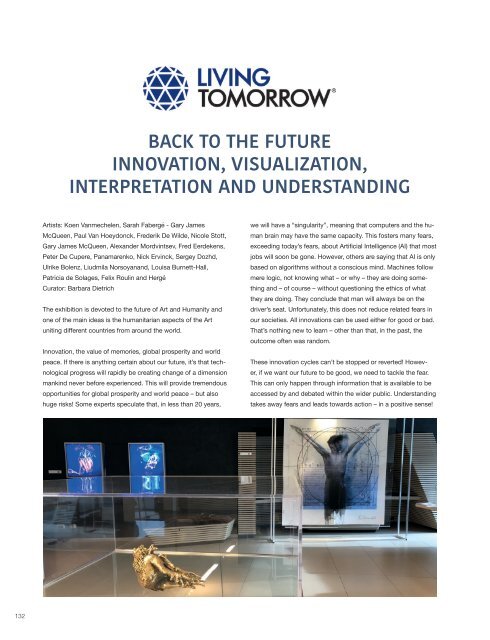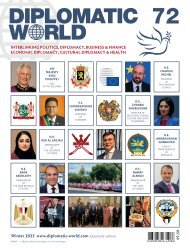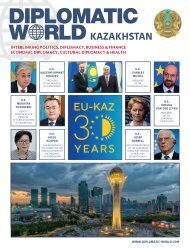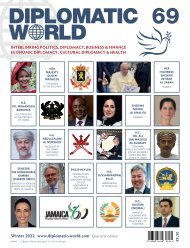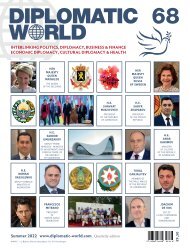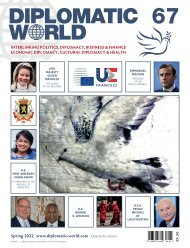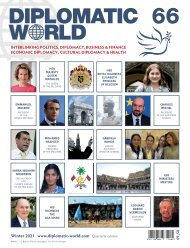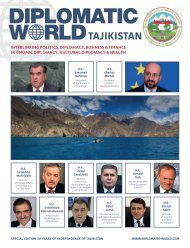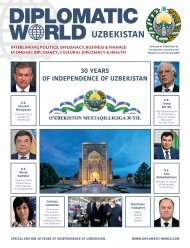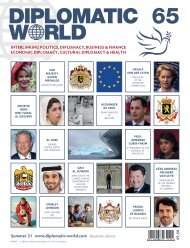Diplomatic World 67
You also want an ePaper? Increase the reach of your titles
YUMPU automatically turns print PDFs into web optimized ePapers that Google loves.
Alexander Mordvintsev<br />
Researcher and Artist in Living Tomorrow<br />
BACK TO THE FUTURE<br />
INNOVATION, VISUALIZATION,<br />
INTERPRETATION AND UNDERSTANDING<br />
Artists: Koen Vanmechelen, Sarah Fabergé - Gary James<br />
McQueen, Paul Van Hoeydonck, Frederik De Wilde, Nicole Stott,<br />
Gary James McQueen, Alexander Mordvintsev, Fred Eerdekens,<br />
Peter De Cupere, Panamarenko, Nick Ervinck, Sergey Dozhd,<br />
Ulrike Bolenz, Liudmila Norsoyanand, Louisa Burnett-Hall,<br />
Patricia de Solages, Felix Roulin and Hergé<br />
Curator: Barbara Dietrich<br />
The exhibition is devoted to the future of Art and Humanity and<br />
one of the main ideas is the humanitarian aspects of the Art<br />
uniting different countries from around the world.<br />
Innovation, the value of memories, global prosperity and world<br />
peace. If there is anything certain about our future, it’s that technological<br />
progress will rapidly be creating change of a dimension<br />
mankind never before experienced. This will provide tremendous<br />
opportunities for global prosperity and world peace – but also<br />
huge risks! Some experts speculate that, in less than 20 years,<br />
we will have a “singularity”, meaning that computers and the human<br />
brain may have the same capacity. This fosters many fears,<br />
exceeding today’s fears, about Artificial Intelligence (AI) that most<br />
jobs will soon be gone. However, others are saying that AI is only<br />
based on algorithms without a conscious mind. Machines follow<br />
mere logic, not knowing what – or why – they are doing something<br />
and – of course – without questioning the ethics of what<br />
they are doing. They conclude that man will always be on the<br />
driver’s seat. Unfortunately, this does not reduce related fears in<br />
our societies. All innovations can be used either for good or bad.<br />
That’s nothing new to learn – other than that, in the past, the<br />
outcome often was random.<br />
These innovation cycles can’t be stopped or reverted! However,<br />
if we want our future to be good, we need to tackle the fear.<br />
This can only happen through information that is available to be<br />
accessed by and debated within the wider public. Understanding<br />
takes away fears and leads towards action – in a positive sense!<br />
I like Emergent Phenomenas, Machine Learning, Computer Graphics and Vision.<br />
I like to visualize things. DeepDream is my most known creation. I'm working at Google Research on<br />
Deep Neural Network visualization, interpretation and understanding.<br />
Alexander Mordvintsev invented Google DeepDream, launching an entirely new subgenre of<br />
art using neural networks – and transforming how we visualize images in AI.<br />
132 133


